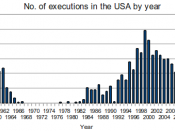Capital punishment is the lawful infliction of the death penalty, and since ancient
times has been used as punishment for a wide variety of offenses ( Software Toolworks
Encyclopedia: Capital Punishment ). The standard for this judgment is that the
punishment must be based on the severity of the offense. 'Murder, for example is widely
considered an offense meriting the death penalty- In which case is called a capital
offense-or life imprisonment.' ( Software Toolworks Encyclopedia: Crime ). A central
principal of a just society is that each person is given the right to 'life, liberty, and the
pursuit of happiness;' irreguardless of the crime that is committed society is not justified
in denying the right to life through the institution of capital punishment.
Throughout history, various forms of capital punishment have been put to use,
'from stoning in biblical times, crucifixion under the Romans, beheading in France, to
those we use in the United Stated today' (Software Toolworks Encyclopedia: Capital
Punishment). As such, capital punishment is imposed in thirty-eight states, and two
more are considering its reinstatement; however, there is also a debate on how quickly
the sentence to death should be carried out. This debate has left almost three thousand
inmates awaiting execution ( Carro 631 ). The present forms of capital punishment range
from lethal injection to electrocution ( Peacenets Prison Information Desk n.pag. ). Used
as a method of execution, electrocution makes the body a conductor for approximately
five amperes of current at two thousand volts. Auburn State Prison in New York was the
first to use the electric chair in 1890, and it temporarily became the main form of
execution. However, lethal injection has since surpassed electrocution in it's frequency.
Lethal injection consists of the convicted criminal being injected with a deadly dose of
barbiturates via an intravenous tube. 'The process resembles the method used for a
patient undergoing anesthesia before surgery.' ( Software Toolworks Encyclopedia:
Lethal Injection ). This method, now used in Texas as well as twenty six other states, is
considered a more humane form of carrying out the death penalty ( Peacenets Prison
Information Desk n. pag. ).
'The debate over capital punishment can be traced as far back as biblical times.
There is a contradiction in the Bible between the fifth commandment, 'Thou shall not
kill,' and the idea of retribution of 'an eye for and eye' ( Carro n. pag. ). Retribution is
essential for the good of our society. However; this does not validate the death penalty.
'The entire basis on which our community is built is each citizen honoring the rightful
claims of others' ( Cauthen n.pag. ). These rights include the 8th Amendment to the
Constitution of the United States which prohibits cruel and unusual punishment
(Software Toolworks Encyclopedia: 8th Amendment ). The most compelling arguments
against capital punishment can be based on its administration in our society. These
arguments are as follows: Always present is the possibility of error; sometimes a person
might be put to death who is innocent (Abolition Now n. pag. ). Unfair administration is
also a factor, for capital punishment is often inflicted on the poor and minorities ( Double
Justice: Race and the Death Penalty n. pag ). 'An abundance of evidence demonstrates
that racial bias continues to influence death sentencing' ( Double Justice: Race and the
Death Penalty n. pa. ). There is also the weakness of argument from deterrence. 'There
is no evidence that the murder rate fluctuates according to the frequency with which the
death penalty is used' ( Software Toolworks Encyclopedia n. pag. ). One of the strongest
arguments against capital punishment is that the system is too incompetent to carry it out.
The technicalities, appeals, and retrials keep prisoners awaiting execution for endless
periods ( Cauthen n. pag. ). This has become yet another injustice. In addition, many
persons who commit vicious crimes have often suffered from neglect, emotional trauma,
violence, cruelty, and abandonment. These circumstances may have damaged their
person so severely that it is unfair to punish them for their wrongdoings (Cauthen n.pag.)
In conclusion of the matter is that no society has the authority to practice capital
punishment. Those that have no eight to institute capital punishment are the ones who do
so. This form of punishment only contributes to the violence. This cultural decay has
made it necessary to unleash even more repression and brutality against citizens to keep
order and halt chaos. The overcrowding of our nations prisons is proof of the system's
inability to create a good society. This massive incarceration points to our lack of
dedication to solve the basic problems of poverty, morality loss, and social
disintegration. While leaders insist that capital punishment will make citizens more
secure, it fails to do so ( Cauthen n. pag. ). It simply spurs violence from violence which
inevitably puts crime on a steady rise ( Cauthen n. pag. ).
'Punishment is an ancient practice whose presence in modern cultures may appear
out of place because it purposefully inflicts pain. In the minds of most people, however,
it continues to find justification' ( Software Toolworks Encyclopedia: Punishment ). The
debate over punishment is not whether or not it should be carries out, but if the
punishment matches the severity of the offense ( Carro 631 ). The main argument over
criminal punishment is the contrast between the death penalty and life imprisonment.
'Capital punishment is the most premeditated of murders,' ( Abolition Now n. pag. ) tp
which unlawful act can be compared to a state's sentence to execution ( Abolition Now n.
pag. ).


